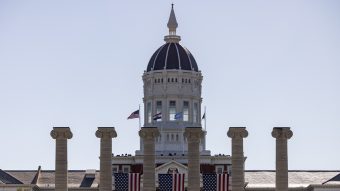Oct. 19, 2020
Contact:
Eric Stann, 573-882-3346, StannE@missouri.edu
Mitchell S. McKinney, 573-489-9709, McKinneyM@missouri.edu
The views and opinions expressed in this “for expert comment” release are based on research and/or opinions of the researcher(s) and/or faculty member(s) and do not reflect the university’s official stance.

COLUMBIA, Mo. – Thursday night, Oct. 22, President Donald Trump and Democratic presidential candidate Joe Biden will meet for the second and final time on the debate stage before voters cast their ballots on Election Day, Nov. 3. Presidential debate expert Mitchell S. McKinney, director of the Political Communication Institute at the University of Missouri, suggests this highly anticipated final debate will cap the most unusual debate cycle in the history of presidential debates.
“We started this presidential debate series with a debate that now stands as the most contentious and attack-oriented exchange in the history of presidential debates, resulting in the third-highest viewed debate,” McKinney said. “This was followed by the first presidential debate to be canceled because Trump refused to participate in the planned ‘virtual’ town hall debate. As a result, there is now great anticipation for the final meeting of these two candidates, where anything could happen on that debate stage.”
McKinney’s experience includes serving as a staff member in both the U.S. Senate and the White House, consulting with the Commission on Presidential Debates on the development of the “Town Hall” debate format and how debates can be structured in order to better educate citizens on significant campaign issues. His expertise has been featured in BBC World News, CNN, C-SPAN, NPR, Reuters, The New York Times and The Washington Post.
Based on his previous analysis, McKinney observes when an incumbent president is trailing the rival candidate going into the final debate, there is typically a lot of drama.
“The final debate encounter in a series featuring an incumbent president trailing the challenger is typically characterized by great clashes and aggression, particularly from the incumbent who is behind in the polls and views this as a last chance to change the dynamics of the race,” McKinney said. “Yet, Donald Trump is now in something of a bind in terms of his highly aggressive first debate with Biden, with post-debate polls showing Trump suffered with many voters who saw his debate performance as far too combative.”
McKinney also points out the Commission on Presidential Debates has not yet announced any additional rule changes for the debate stage.
“Initially following the first debate, the Commission on Presidential Debates said it would put in place ‘additional tools to maintain order’ on the debate stage, yet officials have not announced how they might attempt to rein in an aggressive Donald Trump, should he continue his strategy of repeated interruptions and verbal dominance, while completely ignoring the debate rules,” McKinney said.
McKinney has conducted extensive research on debate performances by presidential candidates, including the numerous primary and general election debate performances of both Donald Trump and Joe Biden.
“Donald Trump needs to rebound from what was widely viewed as a disastrous first debate with Joe Biden, while the Democratic nominee needs to avoid a stumble to maintain his momentum with voters just days before this election will be decided,” McKinney said.
Editor’s Note: To view McKinney’s bio, please click here.
To arrange an interview with Professor McKinney, please contact Eric Stann at 573-882-3346 or StannE@missouri.edu.



